Does Exercise Help Detox? The Sweaty Truth About Fitness and Your Body's Cleansing Power
We've all heard the whispers: exercise is a great way to detoxify your body. But is there any real science behind this popular belief? The answer is nuanced, and it’s time to separate fact from fitness myth. Let's dive into the fascinating world of how exercise interacts with our body's natural detoxification processes.
My name is Dr. Evelyn Reed, and I've spent years researching the human body's incredible ability to cleanse itself. While the idea of exercise as a "detox" is often oversimplified, the truth is far more compelling and multifaceted. It's not about magically flushing out toxins, but rather about enhancing the systems already working tirelessly within you.
What is Detoxification, Really?
Before we explore exercise's role, let's clarify what detoxification actually means. Our bodies are constantly working to remove waste products and harmful substances. This process involves several vital organs, including the liver, kidneys, lungs, and skin. These organs filter blood, break down toxins, and eliminate them through urine, sweat, feces, and breath. It's a continuous, intricate process, not a singular event.
How Does Exercise Support Natural Detoxification Processes?
While exercise isn't a standalone detox, it significantly boosts the efficiency of your body's natural cleansing mechanisms. Think of it as optimizing the engine rather than replacing it. Here's how:
-
Improved Liver Function: Regular physical activity improves blood flow to the liver, enhancing its ability to process and eliminate toxins. A healthier liver means a more efficient detoxifying system.
-
Enhanced Kidney Function: Exercise helps regulate blood pressure and improves kidney filtration, leading to more efficient removal of waste products through urine.
-
Increased Lymphatic Drainage: The lymphatic system plays a crucial role in removing waste and toxins. Exercise, especially activities that involve movement and muscle contractions, stimulates lymphatic flow, improving the body's ability to eliminate waste.
-
Sweating and the Elimination of Toxins: While sweat doesn't magically remove all toxins, it does help eliminate some water-soluble waste products and heavy metals. This is a minor contributor to the overall detoxification process.
Does Exercise Help with Specific Toxins?
Many people wonder about the role of exercise in eliminating specific toxins. Let’s address some common concerns:
Does exercise help remove heavy metals? While some heavy metals are excreted through sweat during exercise, it's not the primary method of elimination. Chelation therapy is a more effective approach for heavy metal detoxification under medical supervision.
Does exercise help with pesticide exposure? Exercise might improve the body's overall ability to process and eliminate substances, including pesticides. However, it's not a substitute for preventative measures like reducing pesticide exposure in the first place.
Does exercise help with alcohol detoxification? Exercise won’t replace the need for proper medical care during alcohol detoxification. Consult a healthcare professional for guidance and support.
The Bottom Line: Exercise and Detoxification
Exercise doesn't act as a magical "detox," but it significantly enhances the body's natural detoxification pathways. By improving blood flow, stimulating lymphatic drainage, and supporting the function of vital organs, regular physical activity optimizes your body's inherent ability to cleanse itself. Remember, a healthy lifestyle, including a balanced diet, adequate hydration, and sufficient sleep, is crucial for optimal detoxification. Talk to your doctor or a qualified healthcare professional before starting any new exercise program, especially if you have underlying health conditions.

